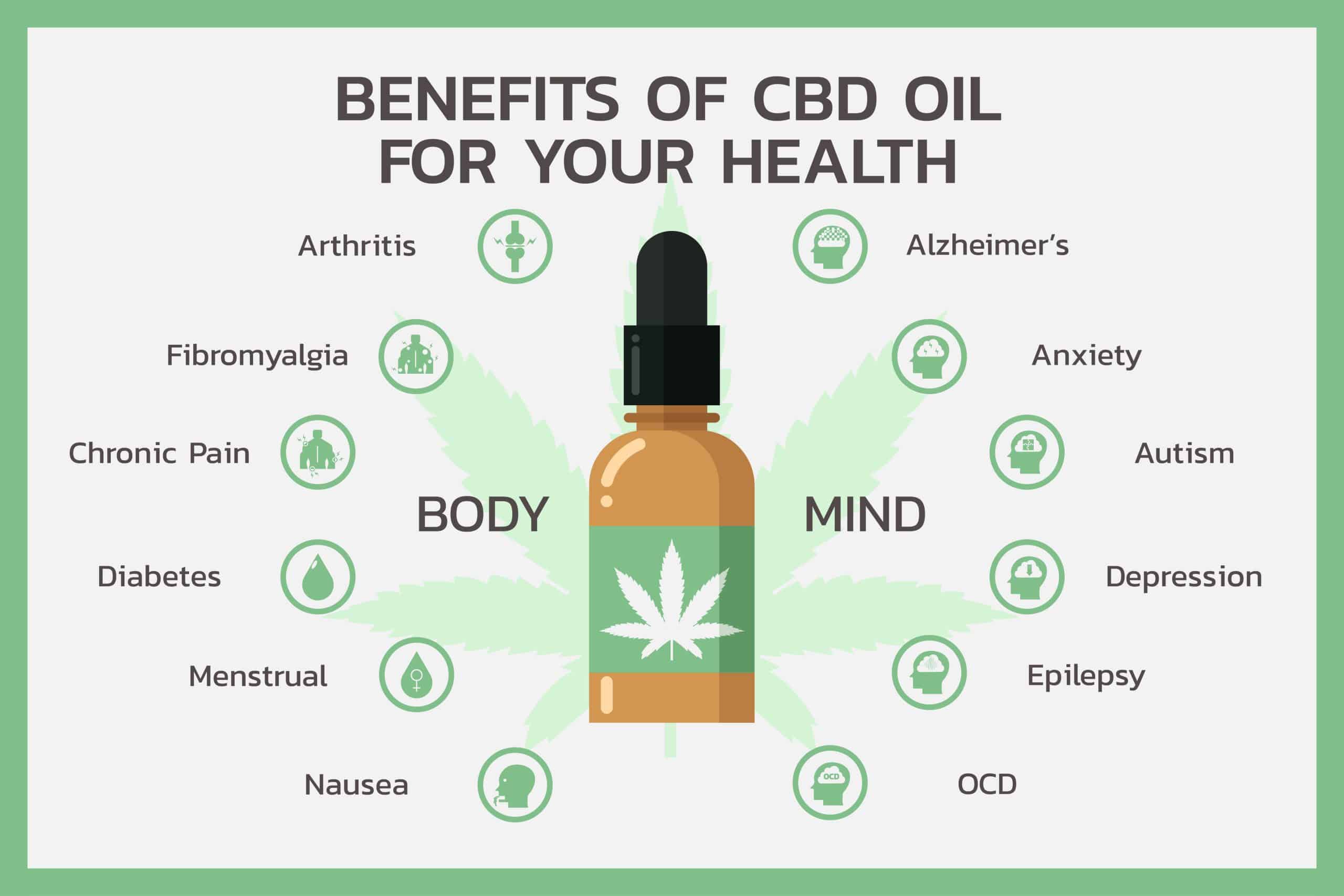Alzheimer's disease is tragically common. It affects 5.5 million Americans, including half of all Americans over the age of 84, and there is no known cure.
But there is hope. Research into medical marijuana has shown that the plant can do wonders for those living with Alzheimer's disease. The plant's benefits mostly come down to two compounds: CBD and THC.

This article will explore some of the key facts about CBD and THC and how they relate to Alzheimer's disease. And it will dive into the CBD vs THC debate to explore the specific benefits of each.
Read on to learn 10 fast facts about Alzheimer's disease, CBD, THC, and the CBD vs THC debate.
It isn't clear what causes Alzheimer's disease. Scientists chalk it up to a combination of genetic, lifestyle, and environmental factors.
There's no Alzheimer's virus or bacteria; it's simply a progressive form of dementia associated with the death of brain cells and the resultant loss of memory, social skills, and intellectual skills.
However, scientists do know what the disease looks like, and one of its hallmarks is plaque buildup. Specifically, the buildup of proteins called amyloid-betas in the tissue of the brain.
This plaque buildup interferes with nutrient transport and cell communication, leading to the death of brain cells. But the good news is there's evidence indicating that THC reduces plaque build up in the brain.
This doesn't mean that THC can cure or prevent Alzheimer's, but it does mean that it can slow the progression of the disease. This is a huge plus for THC in the CBD vs THC debate.
The other major hallmark of Alzheimer's disease is the appearance of "protein tangles." Protein tangles occur when tau protein fibers in the brain twist together, and these tangles lead to many of the same complications caused by plaque buildup.
There is preliminary evidence showing that CBD (along with a few other minor cannabinoids) inhibits the development of these tangles.
So combined, THC and CBD work to counteract the two main hallmarks of Alzheimer's disease. Maybe it's more useful to talk about CDB with THC than CBD vs THC. But unfortunately, not everyone has access to both (more on that later).
Plaque buildup and protein tangles put a lot of stress on brain tissue and stressed out brain tissue swells. This inflammation can cause a chain reaction of swelling and contributes to brain cell death.
In other words, inflammation of the brain tissue is extremely dangerous and one of the biggest problems associated with Alzheimer's disease.
CBD and THC both activate the brain's CB1 receptors, and this activation reduces swelling. In fact, mice bred without CB1 receptors showed much faster cognitive degeneration as compared with a control group.
The effect hasn't been explicitly studied in humans, but all available evidence indicates that the activation of CB1 receptors is very important in preventing the deterioration of brain tissue in Alzheimer's patients.
There is evidence that CBD directly protects brain cells.
For example, CBD has been shown to slow the death of brain cells in patients who are experiencing a stroke or a traumatic brain injury. It has shown similarly protective behavior in patients with high levels of neurotoxicity due to glutamate and hydroperoxide. And it slows the death of brain cells in patients with a decreased flow of oxygen to the brain.
Again, it hasn't been conclusively shown that CBD has the same protective effects on the brains of Alzheimer's patients, but the results are promising.
That's another point for CBD in the CBD vs THC showdown.
The holy grail of Alzheimer's research is brain tissue regeneration, and CBD shows promise.
A study has shown that CBD may be able to not only slow down but reverse the cognitive decline associated with Alzheimer's disease. Mice who had been injected with the diseased showed significant improvement as a result of CBD treatment.
The regenerative effects are likely even stronger when CBD is combined with THC and other cannabinoids, but this is still a big advantage for CBD in the CBD vs THC debate.
Though Alzheimer's is a disease of the brain, it affects all aspects of the patient's life, including their relationships with loved ones. One of the most devastating symptoms of the disease is the personality changes that come along with it.
Sweet, loving people can become angry and mean upon being stricken with the disease. And at the very least, patients often experience anxiety and confusion.
There is evidence that both CBD and THC can do wonders in alleviating these devastating symptoms and in making the lives of patients with Alzheimer's disease more pleasant.
Beyond simply calming patients down, these cannabinoids can also help them regulate their circadian rhythms, maintain a healthy weight, and maintain a healthy appetite.
Even if medical marijuana had no effect on the neural degeneration of Alzheimer's patients, the fact that it helps alleviate their suffering is enough to indicate that marijuana is an extremely powerful and important drug in the fight against Alzheimer's disease.
The marijuana plant contains around 100 different compounds known as cannabinoids, and each one has its own set of side-effects, both positive and negative. But, while studying these cannabinoids individually is helpful, they should really be thought of as part of the same whole.
Ingesting or smoking marijuana as a whole provides a range of benefits that couldn't be derived from consuming individual cannabinoids. That's because the cannabinoids exhibit what is called an entourage effect.
Basically, the whole is greater (or at least different) than the sum of its parts. And researchers have observed this effect in studies.
So if you can, consume the whole plant, and find a plant that is specially bred for your needs.
And the entourage effect isn't the only reason to consume the plant as a whole.
One of the advantages of CBD when considering CBD vs THC is that CBD is non-euphoric. I know what you're thinking: isn't euphoria a good thing? Well yes, but the point is that CBD doesn't act as a psychoactive drug in the same way as THC.
This means that patients can take high doses of CBD without the negative psychological effects (paranoia, anxiety, etc) associated with marijuana. Furthermore, CBD actually mitigates the negative psychological effects caused by THC.
THC has positive health effects, but ingesting pure THC is often an unpleasant experience. By combining CBD and THC (as is found in the marijuana plant) patients can enjoy the positive physical effects of THC without the negative psychological effects.
CBD's non-psychoactive nature gives it another advantage: it's legal. To understand why, you have to look at the legality of cannabis as a whole.
The legality of cannabis in the United States is a complex issue full of semantics. But the key is that hemp is federally legal while marijuana is federally illegal, even though they're the exact same plant.
The legal difference is that hemp contains less than .3% THC. THC has been villainized because it's the cannabinoid most associated with the psychological effects of marijuana consumption, but luckily, it isn't the only cannabinoid that offers health benefits.
Because of this strange legal situation, CBD oil can be extracted from legal hemp and sold to consumers in all 50 US states. CBD oil obviously doesn't provide the health benefits associated with the other cannabinoids, but if you live in a state without medical marijuana, it's a great option for now.
If you live in Arizona, Arkansas, Delaware, Illinois, Maine, Michigan, Minnesota, Mississippi, Missouri, New Hampshire, New Mexico, North Dakota, Ohio, Oregon, Ohio, Rhode Island, or Utah, then you're in luck; medical marijuana is a legal treatment for Alzheimer's in your state. And if you live in DC you can ask for a doctor's permission to use marijuana as Alzheimer's treatment.
Though CDB, THC, and the other cannabinoids each have their own benefits, it's always better to take them in concert. If you don't like the feeling of being high, find a strain with really high levels of CBD to balance out the psychoactive effects of THC.
The important thing is that you use the whole plant if it's legal in your state. It doesn't have to be CBD vs THC, the magic happens when they work together.
In conclusion, medical marijuana and specifically the cannabinoids CBD and THC hold great promise for the future of Alzheimer's research. Research has already revealed incredible properties of both cannabinoids that may change the way we think of Alzheimer's treatment.
CBD seems to provide the wider range of benefits to Alzheimer's patients, but THC is an indispensable partner in the fight against the disease. This isn't about CBD vs THC, this is about getting Alzheimer's patients the help they need with the drugs they need.
Medical marijuana could be the future of Alzheimer's treatment, and that's exciting.
Obtaining a medical card in Utah is a vital step for individuals seeking access to medical canna-medicine for various health conditions. Medical canna-therapy, when prescribed by a qualified medical professional, can provide relief for a range of ailments, from chronic pain to PTSD. However, for many, the process of acquiring a Utah medical card can be scary and expensive! Don't worry, in this quick guide, we will walk you through the steps on how to get the best deal on a medical card in Utah, ensuring you receive the care you need without breaking the bank.

The Fastest and Simplest Way
Call 801-851-5554 and ask what the best deal on a Utah Medical Card is right now.
Utah Medical Card Deals
The best deals happen twice a year - 4/20 and Black Friday. However, there are other deals happening all throughout the year. At KindlyMD, we try to have an active promotion happening all the time, but the best deals happen on 4/20 and Black Friday.
Get it Covered by Insurance
Medicare
Select Health
If you are covered by one of these two insurances and you have a qualifying medical condition you may be eligible for coverage. Utah's medical marijuana program has an approved list of conditions that can be treated with medical cannabis. These conditions include, but are not limited to, chronic pain, epilepsy, HIV/AIDS, multiple sclerosis, and Crohn's disease. Pain is the most common qualifying medical condition.
Use your HSA
Many may not be aware that a medical cannabis card, prescribed for certain health conditions, qualifies as a legitimate medical expense eligible for HSA funds. By leveraging this approach, individuals can utilize pre-tax dollars to cover the costs associated with obtaining and renewing their medical cannabis card. This not only provides a financial advantage but also promotes responsible healthcare planning. It's essential to check with local regulations and HSA providers for specific guidelines, but strategically using HSA funds for a medical cannabis card can be a savvy and legal way to manage healthcare expenses effectively.
Where to Get the Best Deal? We'll make it easy and guide you to a convenient location.
4. KindlyMD | Utah Medical Card Services in Ogden, UT
How Much Is the state fee for a Medical Card in Utah?
As of the last available information in 2023, the application fee for a medical card was $15. This fee is non-refundable and covers the cost of processing your application.
When Will I Get My Card?
Immediately. While you are still in the KindlyMD office we will process your application. Upon approval from the state, you will walk out of the office with an active digital Utah Medical Card. You will also receive your physical Utah medical card in the mail. The card is typically valid for one year, and you can apply for a renewal as long as your qualifying condition still requires medical cannabis treatment.
Dispensary Coupons
Ask KindlyMD about dispensary coupons! Our partner dispensaries often offer major discounts for new Medical Card holders. With your Utah medical card in hand, you are now ready to visit a licensed dispensary to purchase medical cannabis. Utah has a limited number of licensed dispensaries, so it's crucial to research and find the one that best suits your needs and offers competitive prices. Having your medical card will allow you to purchase medical cannabis at a discounted rate compared to recreational users, providing you with the best deal on your medication.
What do I do if my Medical Card is not approved? Can I buy cannabis without a Medical Card?
If you are not approved or simply do not have the budget to purchase a Utah Medical Card we have great option for you. Visit https://kindlymdstore.com/. The KindlyMD Store sells 100% federally legal medical grade cannabis gummies. These gummies are top of the line quality and are designed specifically for medical support. Each product contains specific cannabinoids for specific health concerns. Stop in our physical location at 5097 S 900 E Suite 100, Murray UT 84117 to browse our products or call 801-851-5554 for assistance.
Conclusion
Obtaining a Utah medical card is a multi-step process yet simple through the KindlyMD process. If you're dealing with a qualifying medical condition and believe that medical cannabis could offer relief, don't hesitate to start the process of obtaining your Utah medical card. By following the steps outlined in this guide, you can ensure that you receive the best deal on your medical card and, more importantly, access the care you need to improve your quality of life. Call 801-851-5554 and ask about the current promotion.
Some of the patients we see here at KindlyMD are happy to get their Utah Med Cards and go on their way. They need minimal assistance from us to utilize plant-based medicines effectively. But most patients do better when medication management is included. For that reason, we make medication management a priority.

In the simplest possible terms, medication management is the practice of developing and implementing a plan to take medications safely and effectively. While DIY medication management is entirely possible, patients get the most out of it when they work with trained professionals who understand both the human body and the medications patients are taking.
Whether a patient is utilizing plant-based medicines in concert with a Medical Card or consuming prescription medications, the starting point for medication management is understanding the medications themselves. Clinicians need to know:
The good news is that trained clinicians are pretty familiar with this kind of stuff. If they ever run into a medication they are not familiar with, they have access to numerous professional resources that will answer all their questions.
The patient's role in medication management is taking their medications as prescribed. When it comes to a traditional prescription, doing so is as easy as reading the label and following its instructions. Things are a little different when it comes to plant-based medicines.
Plant-based medicines are not prescribed with the same types of rigid instructions. So patients with a Med Card need to consult with their medical providers to come up with a plan for how plant-based medications will be used. Once a plan has been devised, it is in the patient's best interest to follow that plan, at least until the next visit with the provider.
As you may have guessed, communication between patient and provider is critical. Medication management depends on both parties being forthright and honest. It requires a type of communication that holds nothing back. Needless to say that honesty is the best policy. It is followed closely by openness and transparency.
From the patient's perspective, it is important to inform medical providers about how medications make them feel. This is especially true in the arena of Med Cards and plant-based medicines. Medical providers need to know how plant-based medicines are affecting their patients. They can only know if patients tell them.
Communication and plan modification are helped considerably when patients track medication consumption. A simpler way to explain it is to say that patients should write down when they take their medications, what the dosage was, and how they felt afterward. Tracking is appropriate for both traditional prescription medications and plant-based medicines.
Tying everything together is the idea of modifying plans as needed. This is where medication management earns its keep, so to speak. Rather than continuing the practice of overprescribing for the sake of doing so, medication management calls for modifying plans based on two things: results and science.
No medication plan is absolutely perfect. Furthermore, few clinicians get it right the first time. Medication management requires flexibility and a willingness to admit when a plan isn't working out as expected.
Medication management is something we make a priority here at KindlyMD. Whether you have your Utah Medical Card or not, we can help you get a handle on your medications so that you don't become just another patient subject to the consequences of overprescribing.
What if we told you there could be a way to manage your chronic pain by reducing your consumption of prescription pain medications? Your first thought might be that our team is crazy. If that's the case, we get it. But give us the opportunity to explain how reducing prescription pain meds can be a path toward better pain management.

The KindlyMD approach to pain management has been described on more than one occasion as being non-traditional. That is not a bad thing. In fact, we consider such assessments a complement. Why? Because we want to be different. We designed our approach to pain management to be non-traditional. A big part of it is helping patients work toward reducing their dependence on prescription pain meds.
We developed our approach to pain medicine based on the understanding that certain types of prescription pain meds are not a long-term solution. At some point, patients need to stop taking them. The problem is that stopping cold turkey just does not work. Many patients trying to cut down on prescription pain meds still need some other means of pain relief.
Our clinicians can continue prescribing pain medications as needed. However, we also seek to educate patients about other options. Those options include the Utah Medical Card and access to the plant-based medicines it affords.
The idea behind educating patients about the Med Card is to offer an avenue for gradually reducing their reliance on prescription pain meds. It is entirely possible to begin a plant-based medicine regimen that allows patients to consider not taking their prescription pain meds as often. We have also seen cases in which patients stop their prescription meds altogether.
We cannot make any such guarantees for any patient in particular. All we can do is present the possibilities and educate along the way. Ultimately, each patient responds to plant-based medicines differently. We understand that. We are okay with that.
We have seen plant-based medicines work for a lot of chronic pain patients. And when that happens, amazing things tend to follow. Patients really do experience better pain management while simultaneously reducing their dependence on prescription meds. It is really amazing thing to see.
What we do seems foreign to so many people because we have been locked into traditional pharmacologically based medicine for such a long time. Our Western healthcare system is based entirely on the pharmacological approach. But understand that Western medicine is comparatively new.
Ancient cultures relied on plant-based medicines long before modern pharmacology ever existed. Plant-based medicines have a long and rich history behind them. That history is something we leverage on behalf of our patients. We are happy to do so because we know that plant-based medicines work.
We do not want you to finish this post and assume that we have guaranteed you pain relief with plant-based medicines. We cannot make any guarantees of that nature. All we can say is that plant-based medicines are worth looking into. You can do that by scheduling your first consultation at any one of our clinics.
There is a very real possibility that plant-based medicines could offer you better pain management even while you reduce your consumption of prescription pain meds. But before we make that decision, let us start with a consultation.
The KindlyMD team is here to work with you to help you feel better. Just know that you are ultimately in control of your healthcare and any decisions you make. We are here to work with you as a partner in better pain management.
Healthcare is a tricky proposition. Providers genuinely want to help patients, but they are often caught in a trap of offering one-size-fits-all treatment plans just to keep traffic moving. Here at KindlyMD, we are more likely to recommend a tailored medical treatment plan. A tailored plan might even include a recommendation for a Utah Medical Card.
Have you ever been offered a tailored treatment plan from another medical provider? If not, you really don't know what you're missing. Tailored treatment plans are far superior to the one-size-fits-all approach to medicine. They are especially beneficial to people suffering with chronic conditions.
We live in a day and age in which people can get customized services covering just about every need. You can call for a ride on demand. You can get practically any type of food delivered right to your door. You can get what you want, when you want it, and pretty much how you want it as well – except in healthcare.
KindlyMD aims to change that. We offer tailored treatments that often include Medical Cards for those who qualify. Our tailored treatments account for:
If you were to visit one of our clinics in hopes of getting a Medical Card, we would do a complete evaluation of your past medical history and current health. We would seek to know as much as we can about you, knowing that a better understanding of you as a person gives us a better understanding of how to best treat you.
Whether a patient is looking to get a Utah Medical Card or not, tailored treatments are still better than one-size-fits-all recommendations. Here are some of the benefits of going with a tailored plan:
Combine all these benefits together and you will have an improved quality of life. That is really what we are all about here at KindlyMD. We know that tailored treatments, Medical Cards, etc. don't necessarily guarantee a patient will be cured. But what we do does help patients feel better in both the short and long term.
Assuming you qualify for a Utah Medical Card, you've probably been dealing with your condition for a long time. We're guessing you have tried traditional treatments without success. We want you to know this one thing: it is time for you to feel better.
A tailored treatment plan that accounts for your unique needs and circumstances can help you get there. Best of all, your access to a tailored plan begins by contacting KindlyMD to make an appointment. Come visit any of our clinics throughout Utah where you will consult with a licensed medical professional whose number one goal is to help you feel better.

While many of our patients come to us on their own, there are those who make appointments with our clinics based on a recommendation from their primary care physicians. Their doctors advise pain management over relying solely on pharmacological treatments. Why would a doctor do that?
Prescription medications are often the frontline treatment for chronic pain. Among the many choices are corticosteroids, a class of prescription medications well known for their anti-inflammatory properties. Corticosteroids are commonly prescribed for rheumatoid arthritis, inflammatory bowel disease, and other conditions.
If you have been on corticosteroids for a while and have been urged by your GP to see a pain management physician instead, heed that advice. There are particularly good reasons for being cautious about long-term corticosteroid use.
Corticosteroids are generally safe when prescribed according to standards and guidelines. But like any other prescription medication, corticosteroids do have their side effects. Over time, those side effects can lead to other health conditions – some of which can be serious.
Conversely, pain management physicians are trained to utilize a variety of treatments over and above prescription medications. This is not to say that a pain management doctor will not write a prescription. It is to say that the doctor will be fully versed in other treatments as well. This is beneficial for patients in that they have more options.
Just as an example, one of the options we look at here at KindlyMD is the Utah Medical Card. It is a state-issued card that gives patients access to certain plant-based medicines. The medicines aren't appropriate for every condition under the sun. However, they are appropriate for pain management.
Getting back to the original topic, there are consequences associated with corticosteroids. Using corticosteroids for a short time isn't likely to have a long-lasting impact on the body. But long-term use is another issue. In the long term, corticosteroids can contribute to:
It is important to note that not every patient who uses corticosteroids long-term will be impacted by the potential side effects. In fact, most patients will not. But if your doctor recommends dialing back the corticosteroids in favor of a pain management strategy, they may believe you are at greater risk for complications.
As a general rule, pain management tends to take a more holistic approach to dealing with chronic pain. That is certainly our philosophy at KindlyMD. Our goal isn't to simply to cover up the pain and make it more bearable. It is to help patients feel better by managing their pain, and its root causes, through a variety of treatments and strategies.
Everything from the Utah Medical Card to physical therapy and mental health assistance is on the table here. We believe in the holistic approach. We believe that a person's physical, mental, and emotional health are all intrinsically connected.
If your doctor recommends you see a pain management specialist so that you can dial back the corticosteroids, heed that advice. There are very good reasons for such a recommendation. And if you live here in Utah, we hope you will consider visiting the pain management specialists here at KindlyMD.

Among the services we offer here at KindlyMD is medication management. As a culture that depends so heavily on prescription medications, we rely on our medical providers to guide us along the medication pathway safely and effectively. That does not always happen. For that very reason, we passionately believe that medication management in the U.S. could use some adjusting.
Our philosophy is that medication is just one of many tools medical providers can bring to bear as they seek to help patients feel better. It is not the only tool. It's also not the best tool in every situation. Unfortunately, the reliance on prescription medications has become so pervasive in the American healthcare system that too many patients are subject to overprescribing.
Overprescribing occurs when patients end up taking too many drugs, too frequently. We see it all the time in pain medicine. Narcotic pain meds are the go-to pain management tool that many doctors turn to without a second thought. Patients receive one prescription after the next and, before they know it, they have been taking their meds for a lot longer than established guidelines would otherwise recommend.
We have seen similar situations with prescription sleeping pills, antidepressants, and other drugs. Continually writing prescriptions without ever addressing the root cause of the problem is not smart medicine. It is an approach that seems like something more fitting of the dark ages.
Our goal with medication management is to bring it out of the dark ages and into the 21st century. Our clinicians reach beyond normally prescribed medications to look at other treatments that are equally or more effective. As part of our approach to medication management, we try to introduce qualified patients to plant-based therapies.
One downside of the traditional approach to medication management is that it only considers FDA-approved medications. There is nothing wrong with such medications per se. In order to gain FDA approval, a pharmaceutical company must prove both efficacy and safety. So there is science behind their products.
On the other hand, plant-based medicines do not have FDA approval for the most part. That is not because the medicines are unsafe or don't work. It is because they do not require approval by law. Yet this does not equate to quackery. Plant-based medicines are science-informed, which is to say that they are backed by scientific principles long accepted in Western medicine.
For example, we already know how certain types of natural substances interact with the human body based on how their molecules bind with brain receptors. So even though a plant-based medicine hasn't been approved by the FDA after rigorous safety and efficacy testing, science does inform us as to how that medicine will affect a patient. The science informs us how the medicine might be used to treat a patient.
The strongest case for changing America's approach to medication management is the fact that our current system is not working. We have far too many patients chasing medications that are not helping them. Meanwhile, we have medical providers beholden to a system that gives them very little room to be flexible. The ones who suffer from this arrangement are patients themselves.
We believe medication management needs to account for plant-based alternatives. In fact, it needs to account for a full range of alternatives to Western medical standards. Medication management is vital to patient health. But if it is intentionally limited by the old ways of doing things, patients cannot be cared for the way they should be.